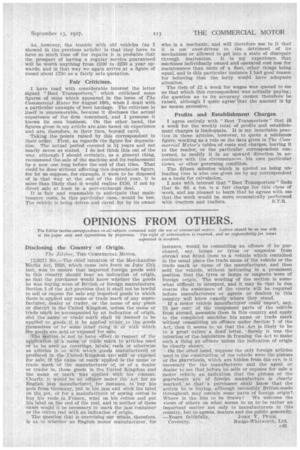OPINIONS FROM OTHERS.
Page 65

If you've noticed an error in this article please click here to report it so we can fix it.
The Editor invites correspondence on all subjects ,:onnected with the use of commercial motors. Letters should be on one side of the paper only and -typewritten 'by preference. The right of abbreviation is reserved, and no responsibility for views expressed is accepted.
Disclosing the Country of Origin.
The Editor, THE COMMERCIAL MOTOR.
[2,627] Sir,—The chief intention of the Merchandise Marks Act, 1926, which came into force on June 15th last, was to ensure that imported foreign goods sold in this country should bear an indication of origin, so that the purchaser would know whether the goods he was buying were of British or foreign manufacture. Section 1 of the Act provides that it shall not be lawful to sell or expose for sale any imported goods to which there is applied any name or trade mark of any manufacturer, dealer or trader, or the name of any place or district in the United Kingdona, Unless the name or 'trade Mark be aecompanied by an indication of origin, and the .name or trade' markshall be deemedtobe applied' to goods. it it be applied 'either,. to the goods :11aanselves or to some other thing in or with which -the goods are sold or-exposed for sale.
The ;.,ection is not to have effect,in 'respect of the application Of *a name: or trade' mark to articles used or to be used as coverings, labels; reels or otherwise as article's in or With which goods manufactured or prod-deed in. the UnitedJC:ingdom are, Sold or e±posed for sale, :it the name .or, markapplied -is-the nathe'or trade Mark of the manufacturer of, or of a dealer or trader in, those goods in the United. Kingdom and the nana-? or Mark -Was Applied Withhis consent. Clearly, it would be no offence under. the Act for an English jam manufacturer, for instance, to' buy his pots from Germany, put in his jam and stick his label on the pot, oifor a. manufacturer of sewing cotton to buy his reels in .France, wind on his cotton and put his label on the end of the reel, and in neither of these cases would it be necessary, to mark the jam container or the cotton reel with an indication of origin.
The question that is exercising our minds, therefore, is as to whether an 'English motor manufacturer, for instance, would be committing an offence if he purchased, say, lamps or tyres or magnetos 'from abroad and fitted them to a vehicle Which contained in the usual place the trade name of the vehicle or the trade mark or name of the manufacturer, and then sold the vehicle, without indicating in a prominent position that the tyres or lamps or magneto were of foreign origin. The wording of the section is somewhat difficult to interpret, and it may be that in dtie course the assistance of the courts will be required before manufacturers or agents or dealers, in this country will know exactly where they stand.
If a motor vehicle manufacturer could import, say, 75 Per cent: Of the •eeniportent parts of the vehicle from abroad, assemble them in this country and apply to the completed Machine. his name or trade mark withoUt cOmniitting an offence under Section 1' of the Act, then it seems to, us that the Act is likely to be to n great 'extent a dead' letter. ,Surely it was the intention of the legislature in framing the Act to make such a thing an offence unless the indication of origin be clearly shown.
On the other hand, suppose the only foreign articles Used in the construction of the vehicle were the pistons or the gearwheels, which are hidden from the eye, is it necessary for the manufacturer and the agent or dealer to: see that before he sells or exposes for sale a 'motor vehicle an indication that the pistons or the gearwheels are' Of fOreign manufacture is clearly inrked,' so that' a purchaser shall know that the article he is buying, although ostensibly British-made throughout, may contain some parts of foreign origin? Where is the line to be drawn? We welcome the views of others on what seems to us to, be rather an Important matter not only to manufacturers in this country, but to agents, dealers and the public generally.
—Yours faithfully, JOHN V. PUGH., Coventry. Rudge-Whitwerth, Ltd.












































































































